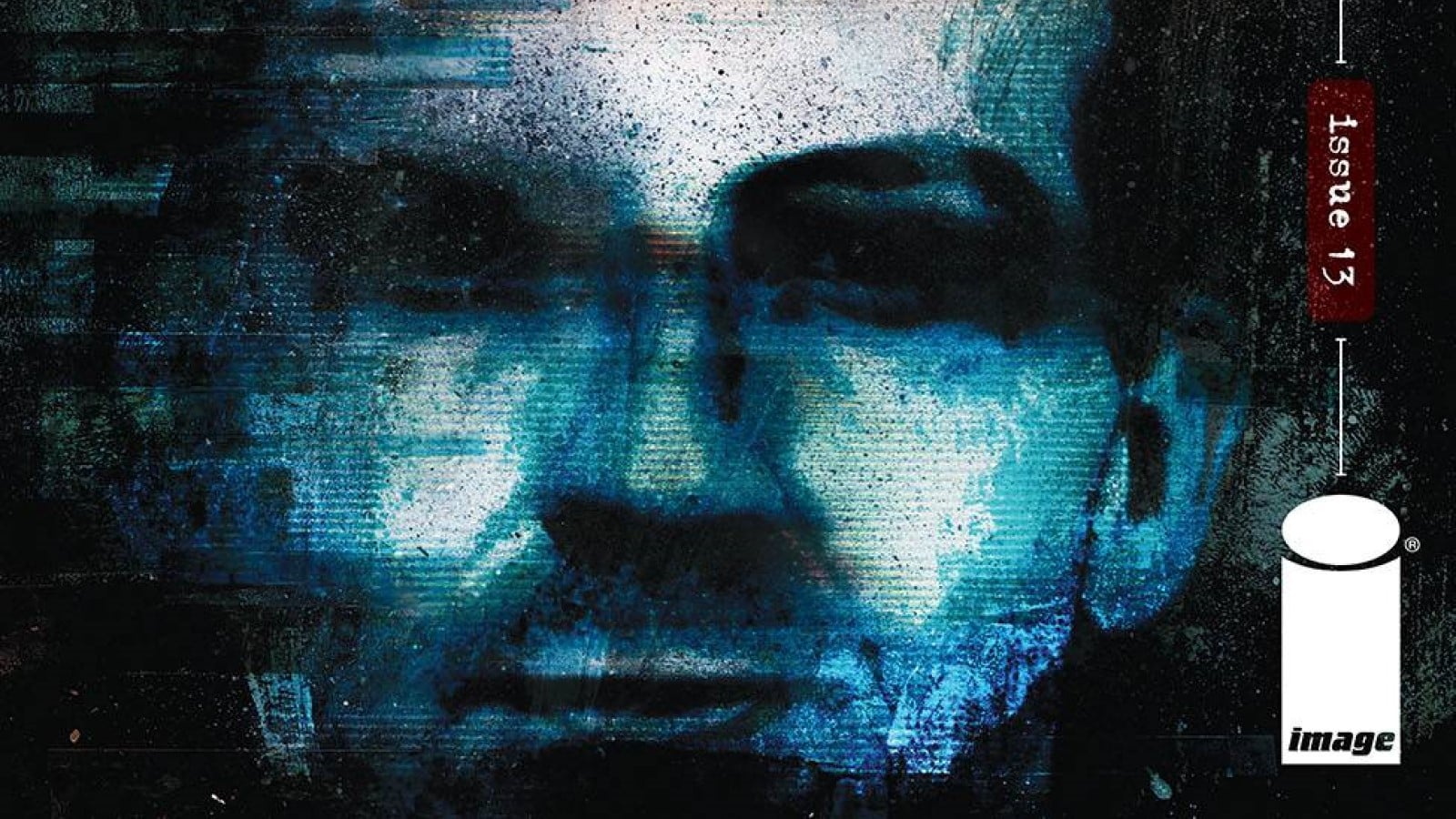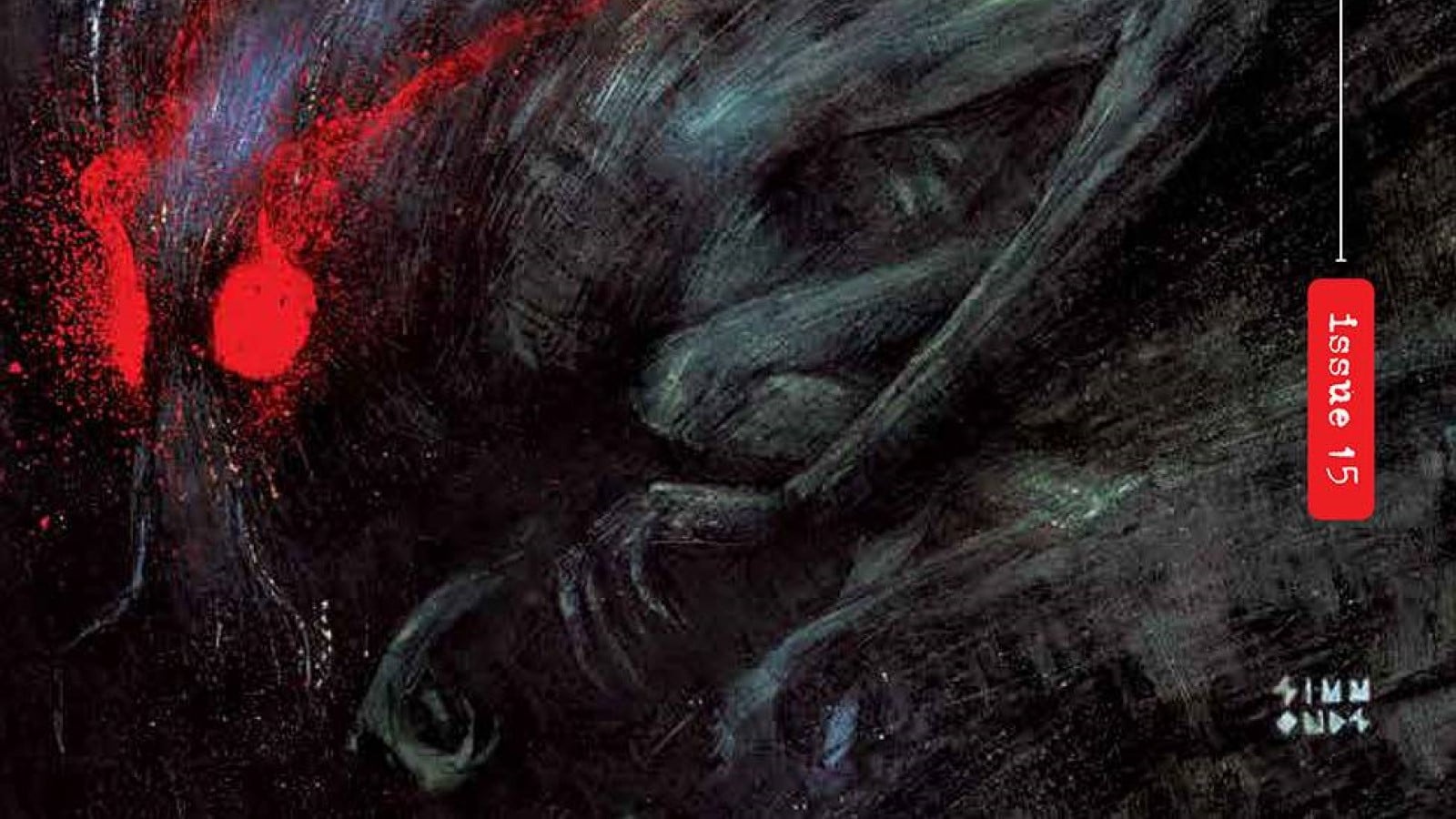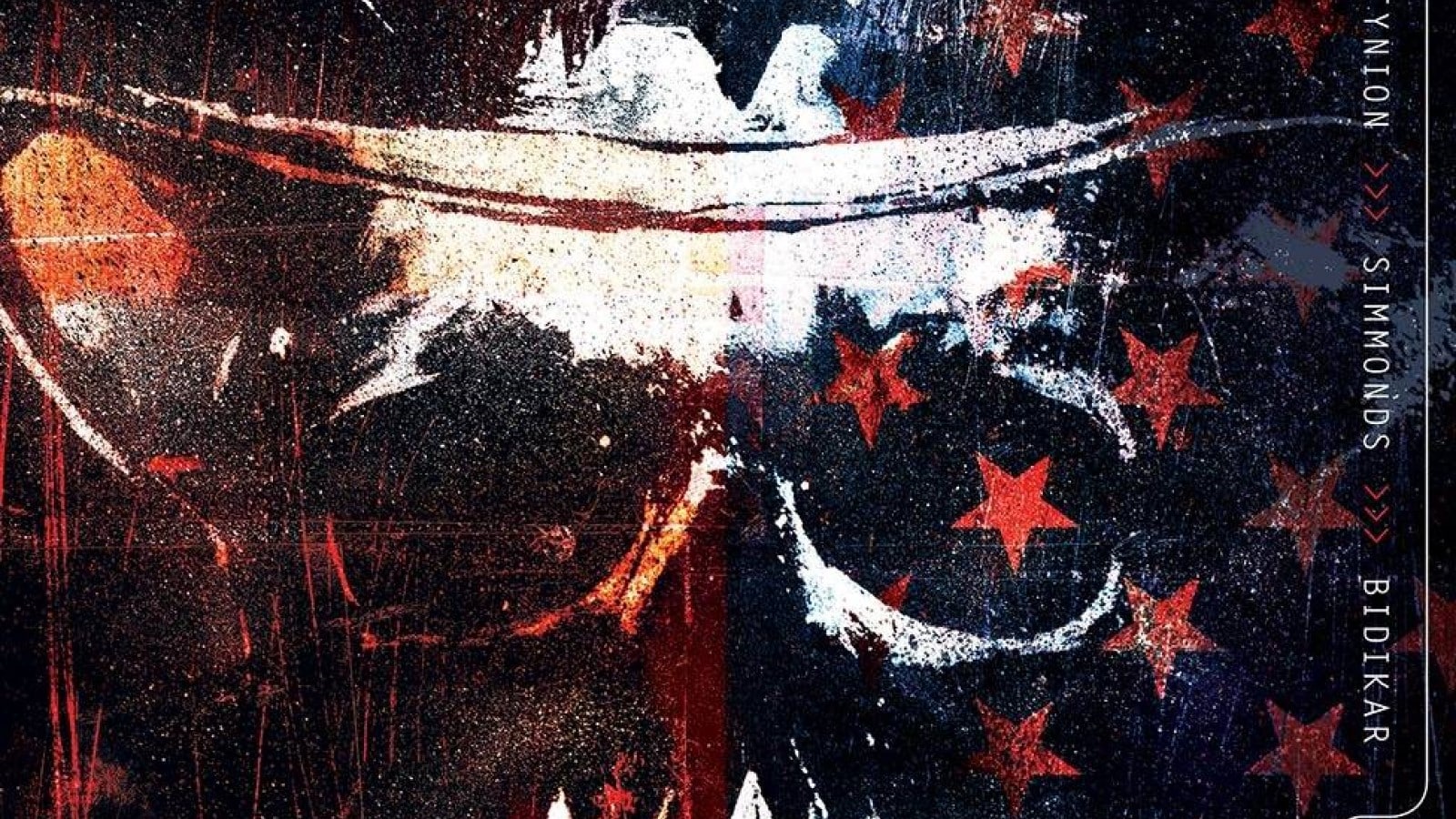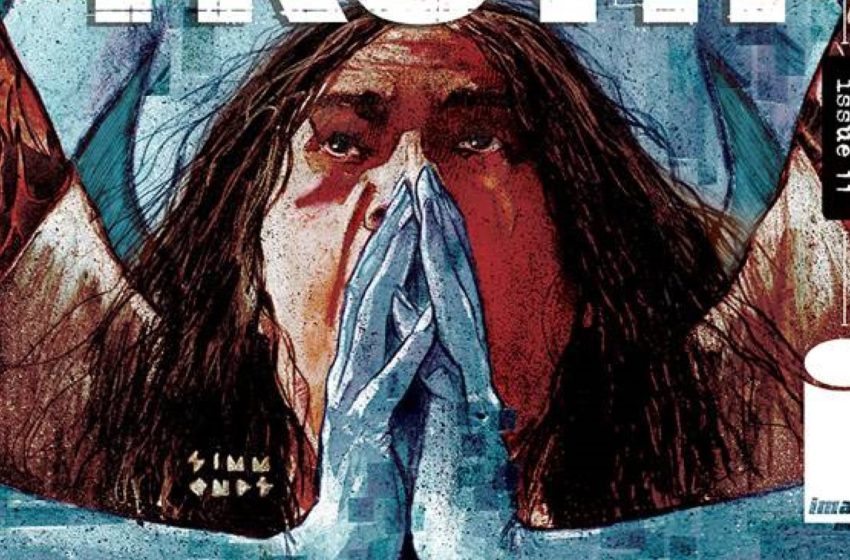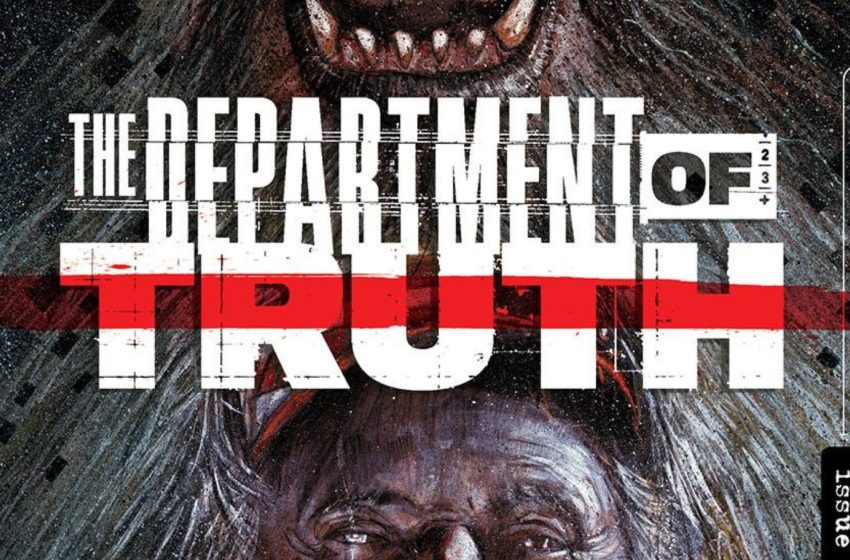The clock is winding down, and it’s time for Agent Cole Turner to call the play. But does he even know who’s playing for which team in Department of Truth #13, written by James Tynion IV, illustrated by Martin Simmonds, lettered by Aditya Bidikar, designed by Dylan Todd and edited by Steve Foxe.
Will Nevin: Forrest, I don’t know if you know this, but I only *really* started covering this book so I could include links to Skeptoid, one of my favorite podcasts that takes a skeptical look at conspiracy theories, pseudo-history and science and all manner of other bullshit currently throbbing like a tumor in our collective consciousness.
Forrest Hollingsworth: Well, Will, I started covering this book so I could talk about my own theories. How come we never get to talk about my theories? Can we talk about me for once, please?
Will: Well, hell, Forrest, go right ahead. What’s on your mind?
Forrest: It bothers me that lowercase b and capital B face the same direction, but lowercase d and capital D don’t. We need to refocus our “Big D” energies.
Will: Fuck, that hurts my brain.
Anywho, you brought up something in our intraoffice chats — Alex Jones and his big legal L — that lets me shamelessly plug another favorite podcast of mine, Knowledge Fight, a show devoted to debunking Jones and generally exposing him as a malevolent, blustery idiot.
Jones losing a defamation suit to Sandy Hook parents is a win for decency and emphasizes the notion that the First Amendment doesn’t entitle you to say evil and (more importantly for the purposes of defamation) reputation-ruining things without consequence. To thread this into Department of Truth, this ties nicely back into issue #3, that stunning look at a parent who convinced themselves a school shooting didn’t happen and, more generally, proof that you can’t manifest reality in the real world.
Forrest, what do you think of Jones as a media presence/instigator, and how do you see him tying into Department’s themes?
Forrest: This isn’t what I meant when I said “I get nervous when we aren’t about me,” but I’ll roll with it.
In short, I think Alex Jones doesn’t believe in anything. His position is malleable, his rhetoric is intangible, his mannerisms, beliefs and enemies are so constantly shifting that it’s almost impressively incoherent. He is an ouroboros, a contradictory controversy chameleon so individually insignificant that one would wonder why we’d even make reference to him. He represents absolutely nothing but opposition to someone, something, anything.
He’s much like Black Hat themselves in that way, the content is secondary to the contrarianism — an invocation of the American impulse to always be fighting, that caring about other people somehow categorically puts your own freedoms in danger. I think he sucks, and I think he deserves whatever he gets. One can only hope the same kind of retribution is inevitably in store here in Department. Should we dig in?
Will: Ho-lee shit, what a read. So much tension, some nice plot twists and a sense that Tynion and Co. are nowhere near finished. Really, aside from a quibble I’m going to drop down in our potpourri notes, I’ve got nothing bad to say about this issue. Excited as fuck to see where this series goes.
Also, this is your spoiler warning. Read the book before you read this. Please, Loyal Content Consumer.
Secret Double (Triple?) Agent Man

Will: The first big reveal in this issue is that Hawk — who we saw turn in the last time out — is actually not fully in bed with Black Hat. Apparently he got in, figured out Barker hogs the covers and then got out? Or maybe he thought he was choosing the lesser of two evils and figured out that particular calculation was wrong. What did you think of this story beat?
Forrest: So, in conjunction with what I was saying (or trying to say) about Jones above, I think Hawk was taken in by the malleability of Black Hat’s message. That he’s the most “Americanized” character in the cast is no mistake. He wears the hat, he smokes the smokes, he speaks the lingo. He’s invested in a bygone area of individuality and freedom that he, inevitably, felt the Department was undermining despite his complicity.
He was choosing the lesser of two evils, but only because Black Hat successfully positioned themselves that way. Not because they actually are. He brought that message, they merely adopted it or postured toward it — that’s how the signifiers of global conspiracy and control tend to work.
It’s a tragedy, but I will push back on Tynion’s take just a little bit and say that Hawk being a tragic character is somewhat … uncompelling after he was made to be so unlikable.
Will: I’m with you on that one — you can’t spend so much time making him so loathsome without some consequence. And, of course, that just sets us up for the major reveal: Hawk’s belief that Department boss Lee Harvey Oswald is actually a tulpa rather than a literal, physical, ordinary man. Coming back to Oswald took me for a loop since Tynion hasn’t done much with the character since introducing him, but, lord, what a card to keep in your back pocket. The bit left me stunned.
Forrest: It’s the perfect kind of reveal, something or rather someone that goes unremarked upon for so long — the status quo — only to be revealed as inherently flawed or manipulative, a system of millions of lies propped up by just one. I think the way they get there, too, with a conversation ostensibly about the Satanic Panic but also about a kind of prolonged rationalization, people operating or upholding a pattern of beliefs across literal centuries, perpetuating lies until they reach a point of self-reliance, is very powerful.
Simmonds accentuates the descent, whether that be deeper into the conspiracy or like unearthing some core truth unsaid, with a pairing of Hieronymous Bosch and Francis Bacon-a-like backgrounds that speak not only to Cole’s very immediate descent into his own demons, but also through a much deeper, more pervasive darkness. It’s a really exceptionally dense visual and dialogic statement, but I think it’s also masterfully done.
Waiting in the Grassy Knoll

Will: What kind of bold predictions you got for the next arc? I mean, I guess I could read solicits, but what’s the fun in that? Seems like we’re definitely in store for more Ruby and maybe Cole starts poking around in his boss’ history. More of the Woman in Red. All sorts of things to be explored.
Forrest: So, we talked about this briefly offline Will, and I think this is where we diverge.
While this issue in singular form is exceptional, I am not that enthused or confident about the future of the series. There’s so much catharsis and revelation here: Cole is given the tools to recognize and process his trauma, the plots of both the Department and Black Hat are unraveled, the women in red’s name (Babalon) is exposed, giving a significant insight into her motivations, the main “villain” is revealed, Hawk has a — for the moment — competent plan. There’s not much left to say or do moving into another arc unless you dramatically change the book’s narrative scope, emotional thrust and even cast.
It would betray Cole’s character for him to suddenly become a super competent agent capable of further infiltrating or evading both Black Hat and the Department even under Hawk’s guidance. Hawk is compromised both physically and intellectually. Further manipulation of the rules would feel fitting to the nature of conspiratorial thinking and systems, but also at some point unfair to the reader.
It’s not that I don’t see a satisfying ending, because that seems intact for Cole’s character arc, but it’s that I don’t see how we’re compelled to believe anything but the ending is next. Tynion could very well be seeing the one thing I haven’t accounted for, of course, but I felt such a satisfaction with how things unraveled here that I feel artificially furthering them would feel … undeserved.
Will: Huh. I hadn’t thought the end might be near … but you make a compelling case there, Forrest.
Pay the Man

Will: Finally, let’s talk about Tynion’s Substack and his decision to bring a little part of the Department of Truth universe to it. Generally speaking, I super duper want creators to make as much money as they can … but I’m also not super excited to sign up for a Substack? Maybe I’m just obstinate. Looking at this alone, what did you think of Tynion’s first chapter of Wild Fictions? I was a little surprised that it was prose.
Forrest: Every issue of Department to date has been more and more expository, so I can’t say I’m completely surprised, but I find it an interesting periphery story and experiment regardless. The content is digestible, you can see how it fits into Department’s world easily in diegetic form (and reveals some interesting pieces about their process), and you can’t deny it’s well written, if a little inessential feeling.
Ultimately, though, and I’ll admit to being contradictory here because I don’t like the visual elements in a lot of DoT’s prose parts (they obfuscate the content!), but I did think this was a little visually barren. That may be something readers are expecting with subscribing to a writer’s Substack, but given that it’s still a collaborative piece between Tynion, Foxe, designer Dylan Todd and more, I think there’s a lot of room left for experimentation. We’ll have to keep track of it as it expands, hopefully into Mothman’s sweet cheeks.
An Eye for an Eye, A Truth for a Truth
- Live by the two-page spread, die by the two-page spread. Awkward text placement made for some confusing reading in this week’s big showpiece. Also didn’t help that comiXology has (as of this writing) a version that breaks the spread into two pages.

